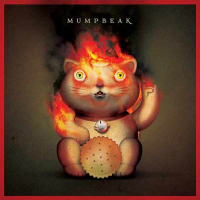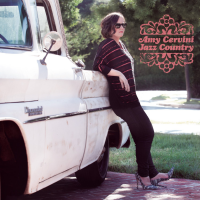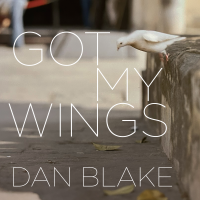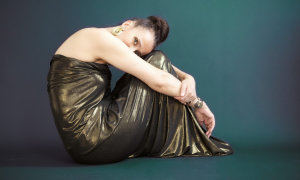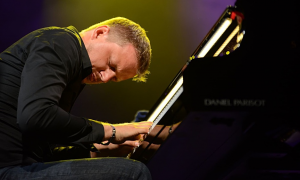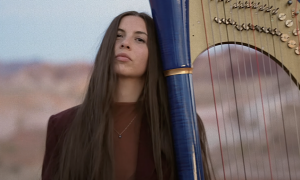Home » Jazz Articles » Interview » Wadada Leo Smith: I'm A Dreamer
Wadada Leo Smith: I'm A Dreamer
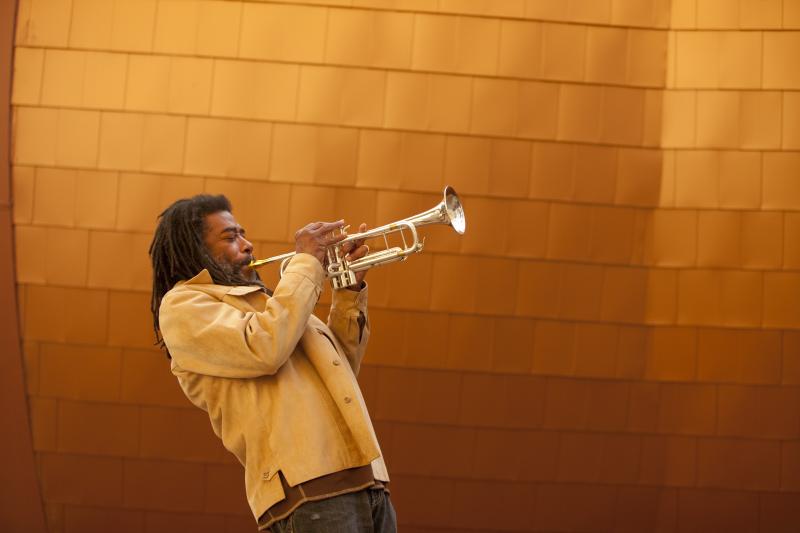
While Ten Freedom Summers might have made the headlines, behind it lies a significant body of work. Smith first came to prominence as one of a unique band of free thinkers brought together in Chicago's famous Association for the Advancement of Creative Musicians in 1968. After a sojourn in Paris, Smith settled in Connecticut where he gathered a group of adventurous young musicians around him in New Haven, co-founded a loose collective called the Creative Musicians Improvisers Forum and also released a series of seminal albums on his own Kabell imprint. Since then he has, forged an iconoclastic path which has taken him around the world, including stints in Japan and Iceland, and amassed a discography of more than fifty albums as leader. In recent years he has become a frequent visitor to the UK, working with a diverse range of improvisers. But it's clear that he has no intention of resting on his laurels, and is still plotting the actualization of still more dreams. AllAboutJazz met Smith at his north London apartment during the European premiere of Ten Freedom Summers.
Chapter Index
Beginnings of Ten Freedom Summers
Inspirations behind the pieces
Capturing Ten Freedom Summers on record
Further Plans
The European Premiere
Working in the UK
Beginnings of Ten Freedom Summers
AllAboutJazz: I would like to talk to you about two particular areas: Ten Freedom Summers, and your interactions with British musicians. Since you were last interviewed for AllAboutJazz your 4CD album Ten Freedom Summers has been released to great acclaim, and now you are in London for the European premiere. Could you explain how that project came about and what it means to you?
Wadada Leo Smith: Well in the very beginning which was in 1977, the first piece that was composed was for Medgar Evers, and it was composed at the request of Leroy Jenkins who was a violinist. I've written a couple of other pieces for his ensembles and he liked the way I composed. He had this new ensemble with [pianist] Anthony Davis and [drummer] Andrew Cyrille, and he wanted a new piece from me to celebrate the beginning of that ensemble. So I had been thinking about the Civil Rights Movement and what it meant and how artists were able to participate in that activity, so I started with what was happening in my State. Medgar Evers had just been assassinated in Mississippi, so I started with him as the first person. That piece was written for a trio but after I started working on the large batch of Ten Freedom Summers, I expanded it to have a viola line, so it has harp, flute, percussion and viola. And our version here in London [with reduced instrumentation] will be violin playing the flute, piano playing the harp, viola, and drums and percussion. So that was the beginning.
AAJ: Did at that point you have the idea that it was going to become part of a larger work?
WLS: No. It was just one way of thinking about how you participate in this struggle for freedom and how hopefully at a later time in this journey, create a debate about the issues. That's basically what I was looking at at that time. And that became one of the main points of Ten Freedom Summers that it gave me a chance to look at those issues and hopefully afterwards people have a chance to think about this problem maybe in their own house or amongst their friends. Because it is not over. And not only is it not over, but it is not just the idea of race which is the biggest issue, but it has to do with sexism and economic captivity and all these things. NAFTA [North American Free Trade Agreement] destroyed most of the economic centers of the planet and it did it in the same way in which these economic crises happened. Only a few people benefit from these things. So those issues are deeply tied up with civil rights and human rights and the social responsibility of people on the planet.
AAJ: At what point did you think you wanted to make a definitive statement about these issues?
WLS: The year two thousand. The reason was that I put together the Golden Quartet in 2000. It made its debut recording in 2000 [Golden Quartet (Tzadik, 2000)] with Jack DeJohnette, Anthony Davis, Malachi Favors. This is a quartet that looks traditional in terms of its instrumentation, but it was a means of looking at how you explore this music through a quartet, because I never did that type of quartet before. Our first performance was at the University of Georgia. They were trying to commission me for a piece, but the commission fell through. But I had just started taking a few notes on the Freedom Riders. So I did "The Freedom Riders Ride" even though I didn't get the commission for it, but I still did it. After that I started doing pieces regularly, not every month, but maybe one or two a year. Then perhaps six years ago I started asking for grants to complete it, and I got eight batches of money in a row to complete it. And I knew it was going to happen then.
AAJ: When you are looking at the individual pieces, what comes first? Is it the inspiration for the work, or is it a musical idea or some sort of interaction between the two?
WLS: Each of the pieces I have to do the research for them.
AAJ: Do you decide: Right I'm going to do a piece on say Lyndon Johnson?
WLS: Yes then I do the research. Exactly. But I don't have the music yet, I just have an idea it's going to be a piece not about, but with, Lyndon B. Johnson as the central part of it. And then I look at his career, and the most important thing that he did was the 1964 Civil Rights Act. Then I go and do the research, and I began to be very enlightened, because you know a lot about this stuff just from the tradition of reading stuff in newspapers, but you don't know any of the background. So I found out that in 1957, Dwight David Eisenhower, president at that time, put forward a Civil Rights Bill. Lyndon Baines Johnson was the Leader of the House. He got every southern guy to vote against it and most of the northern guys. He blocked it. Now what a piece of information. Here's a guy whose legacy is really the Voters Rights Act, because the Vietnamese War destroyed him. His Great Society was just a thing in name only if he didn't do the Civil Rights Act. He blocked it, then seven years later, he's President and he puts forward this Voters Rights Act, which really wasn't his, it was John Fitzgerald Kennedy's. He just changed the name from the New Frontier, which was Kennedy's idea of what he wanted to do. Johnson inherited all of that, he just put the name on it of the Great Society. It's the same program. How weird is that?
AAJ: There was an article earlier this week in the Guardian, suggesting that Kennedy's assassination was perhaps the best thing that could have happened in terms of Civil Rights, because Johnson came in and pushed it through, while if he had lived, Kennedy would not have been able to do that.
WLS: No he wouldn't have been able to do it, because Kennedy had so much opposition against him. When he finally did decide that American society had so many problems socially, he wanted to change it. Him and Bobby [his brother Robert F. Kennedy] was both converted. They came from the most powerful family in America and they also had an enormous amount of wealth. His father was into everything from Nazism to whatever. He came from a special family who had never witnessed any problems. And lo and behold they end up being the President and the Attorney General. Once they got there, they was actually not for any of this stuff. But eventually, every person that takes that office has to find something that's going to make them have a legacy, and they adopt whatever comes along. Now I believe that he changed, I sensed through Robert as well that both of them changed, because Kennedy was the first President to open up the debate about race in our society. He did it in his address to the nation about Civil Rights. The last five minutes or so of his speech was all improvised, it wasn't in the text. He made a strong appeal to the nation to open up our society as these rights were guaranteed by the Constitution. Five minutes after that speech was over, Medgar Evers was assassinated. So those two pieces are internally connected. Then six months later, he [Kennedy] was assassinated.
AAJ: So how does that research and understanding of the situation translate into music, as I know it is not programmatic or narrative.
WLS: It translates like this. My intention was to expose through the Ten Freedom Summers work the psychological effect that this movement had on America. So when I finally get the right balance of research and I'm beginning to be inspired, my effort then is to find one moment in that person's life or in that event and use that as a motivation to reflection and contemplation to decide how I'm going to make the piece. And that moment usually ends up being in the piece. Like with JFK, that piece is only about his body being taken from the Capitol to Arlington to the cemetery. It captures only that small frame. The piece on Medgar Evers is only about when he steps out of the car, and he's shot and he falls down, and the piece on Martin Luther King is about that Memphis Prophecy, the last speech that he gave where he says "I've been to the mountain top." You only normally see five to seven seconds of it, but it's seventeen minutes long—it's on You Tube—it's one of the most powerful speeches that he gave and it was all improvised. So it's about that. Then my March on Washington DC, I got commissioned during the fiftieth anniversary, I just gave the premier in DC three weeks ago, that piece is about the "I have a dream" speech.
Inspirations behind the pieces
AAJ: In terms of researching for this interview, I've found that there are several of the pieces where you've explained a bit about the inspiration which is either in other interviews or on the web, so I thought it might be interesting to ask you about some of the pieces which haven't been covered somewhere else. So I was thinking about the piece "America Parts 1, 2 and 3." Where does that come from?
WLS: That one comes from the 9/11 experience. I have two pieces in the program. One is directly about 9/11 and the other one, "America," is about that country and the transformation that occurred afterwards. People started drinking more. There were more altercations. People felt very much down. The school I teach in I saw it change drastically, where the kids would go to the bathroom and not flush the toilets or they would almost walk over you and not even speak to you. At my school which is a small private school, Cal Arts, they had racial incidents that occurred, all mysteriously, not confrontational. Like white kids destroying black kids art work and things like that. It had a very downward turn, and the middle piece of America, which is that really lyrical one, that's the one hoping for optimism. It represents, not in an inappropriate way but in a philosophical way, a different kind of turn, for optimism. And at the end of it that little solo phrase has a little Arabic turn in it that turns over and over. I put that in there distinctly to show that after this atrocity you've still got to accept these people who live in this country. Because a lot of the Muslims [in the USA] were attacked just randomly and they are still being done like that. So America is about that. But then there is another equation that is completely different, but represents the same thing. America, and I don't mean just the USA, I mean North, Central and South, that's the largest cultural sphere in the world, the most diverse. More diverse than Asia, Africa or Europe together. It has plant life, animal life, an abundance found nowhere else on the planet. So that piece also represents a dream of not the United States but America becoming a unified political, economic and cultural sphere. That's ultimately what it means.
AAJ: Fantastic to hear about such depth of ideas. Let me ask you about the others, then I have a reflection on that. "Rosa Parks"? What was the essential moment behind that piece?
WLS: Well the Montgomery Park bus boycott is the most successful boycott in the history of the world. What happened was that almost 100% participation. Everybody in that city just stopped riding the bus for 381 days. People who had African American women working in their house, they would come and pick them up, and they became their chauffeurs. Really. So many shoes were worn out during that 381 days, because people walked and walked and walked. And you would see cars stuffed with people, like you see in India, same thing. That's the historical connection. But the thing that triggered Rosa Parks, was that when she sat down on the bus and refused to give her seat up, people don't know that she had done that before. But this time they arrested her, and that sparked that fire. But before Martin Luther King came there, she was already fighting these things in all those stores and places. She was a very powerful activist. People often say, well if she hadn't been tired, maybe she would have got up. But that's not true. Because if you look at her history it shows that she had already begun to resist in the struggle. In fact she even wanted to meet force with force at some point. She was more radical than King and those guys.
AAJ: And how have you translated this into music?
WLS: The part where it comes through: now check this out, she was a beautiful lady. One that you'd look at in a photograph and you would fall in love, which is what I did. That theme of "Rosa Parks" is about her energy and activist stuff, but it also captures her beauty. That's what I went for, the way she looked in that photograph. So it's about her. Somebody has put together a video about her on You Tube and they've used my piece, and it's a fantastic video. The record company found it and they hadn't gotten permission. But when they started checking it out, they said this is fantastic and we are not going to do anything, just let it go.
AAJ: "September 11" if that's not too obvious a question?
WLS: It's about 9/11. The most crucial thing about it is that when it happened I was stunned like everybody else, and a lot of times it's difficult to talk about it. When you see those people jumping out of those windows, it busts you open. "September 11" is about that free fall of those people coming out of those windows. Because they selected not to die in a fire and when they came out, they didn't just fall out, they came out gracefully. It's almost like an aerial dance. So what I do is I make it ceremonial, that floating down, knowing that the moment you lift off, you only have a few seconds to live, but if you stay there you may have a few minutes to live. They chose the shortest journey. That to me is pretty courageous. And the other side of it is that all those thousands of people who were killed, and then the bombing of all those other countries, it's also about them as well. It's not just about America, it's a memorial for all of those people. Because in Iraq, they were not responsible for it at all. So all of those victims, in American and in the bombings anywhere, that's what "September 11" is about. And for us in performance it is very emotional.
AAJ: What about "Democracy"?
WLS: We played it last night [the first night of the European premier at Cafe Oto in London], just before "That Sunday Morning", that very fast chaotic piece where I had both the string quartet and the Golden Quartet, that was "Democracy." Democracy is a philosophical idea. It hasn't achieved any status or such anywhere on the planet, historically or now. The Americans talk about democracy and the Europeans, and they talk about a little bit of personal freedom and the ability to develop a little wealth to send their kids to school, but that's not what democracy is. Democracy is a fair exchange of creative ideas of all the people in that community, and that community should have the power to fix whatever is wrong in the people that represent them. But people don't have that power anywhere right now. So the reason "Democracy" is so chaotic in its execution is because nothing happens in these Congresses around the world except that the people there gain power and wealth. They become the richest people in our society all over the planet. And by their acquisition of wealth and power, they cannot possibly relate to the ordinary citizen. That's why they only relate to corporate power. They don't relate to us. So that chaos is about them and about the fact that that idea has to be combated by all kinds of differences, and if it survives it becomes an idea rather than just somebody's opinion. So that enaction of the chaotic stuff that's happening and all that fast stuff bouncing off each other, that's the formulation of the idea. And finally at the end when we all play together—[sings "bam bum beeng"]—there's four of them there—representing North, East, South and West. That represents that single idea that survived out of that chaotic experience to become law. And a law usually has a long history of development before it becomes effective. So we articulate the notion of that law being developed in these four different hemispheres. So "Democracy" is really talking about the world and its ability to be non-dysfunctional and rarely get a good idea through.
AAJ: "Buzzsaw"?
WLS: "Buzzsaw" is about this notion about a free press. There's a very famous book called Buzzsaw. It shows that powerful people, they control the press, not just because they have power and money. But if a book comes out that criticizes any part of their community and they don't like it, even though they don't own the company, they buy all the books from that company and store them in a warehouse and they buy the rights to it. And the book goes out of circulation. Let's say 5000 copies are out there, but not another single copy is coming out. And the news is fixed into an entertainment thing. Every station in America now they've got these little quizzy, quaint elements in the news, that they want you to feel good about, like a beautiful thing happened today in that five dogs and two elephants jumped a rope together or some shit. Then comes three sets of commercials, then they say we're coming up with this great something, then another commercial. Back and forth. That's not news. They are peddling products. But the baseline is that big publishers can block independent publishers by denying them access to distribution, so that this stuff doesn't become popular, and real beautiful information that our society needs worldwide, it doesn't get into the public. They feed us with these top ten books which are really just trivia about sex, money and power, which is really about them. So in "Buzzsaw" my real statement is that there is no free press. I don't mean that there is no independent press but that there is literally no free press. Some come close, but it's not there. For example we have a press in America, it's called Democracy Now. It's a very good show. But everyday now they fundraise. You can't watch it anymore. Because every time you see a little bit of news, they come with their fundraising, and it goes straight on through the day. They were independent, they were small, people were excited to watch. Now they got bigger. They have multiple programs going on, stuff they don't even need. So it means they've got more staff and they need more money, and they've got to fund raise forever. I used to give them money. I stopped. I stopped watching them. Yes they are independent, but they look for the same things as the other guys, they just have different methods.
AAJ: So this is a contextual piece which sets part of the framework that Civil Rights, human rights or whatever sits within?
WLS: Yes because what I want to do is create a debate about every aspect of our society. So my piece, "Dred Scott", that was about the first debate about race in America. People don't even know that. I mention Dred Scott in colleges or universities and nobody has ever heard of Dred Scott. And it's our history, I mean it's all of our histories, not just my history. They don't even know that he petitioned for his freedom as a slave, that he was one of the most famous human beings on the planet, as a slave, and was broke, with no freedom or nothing.
AAJ: Going back to "Buzzsaw," how does that translate into the musical context?
WLS: In "Buzzsaw" most of the construction is around the bass, and it's literally a translation of the buzzing into the bass. John [Lindberg] does it so well with the bow, so it's a literal translation that goes right into the music.
AAJ: The last piece I wanted to ask you about is "Little Rock Nine."
WLS: "Little Rock Nine" is only about that moment when Louis Armstrong called Dwight David Eisenhower and said "if you don't put troops out there to protect those kids going to that school, then I'll never do an ambassador tour for the United States again." Louis Armstrong was an activist who didn't go out and announce what he did. He changed a lot of things in America by just picking up the telephone, because he was powerful. And then the second context is about those kids when they walked through that mob to go into school. That's why things flow in there. And then there is that sharp figure—[sings]—that's that real anger that pops up, and the floating part is the calmness these kids show when they walk through that line. I met Terry Robinson who is one of the kids from that school. He came to the premiere in L.A. Many of the people who were part of the bus riders tradition came. I met young people, but I met old men and women, some black and some white, who were on those buses, and every one of them came crying. Because this piece celebrated them. It's a thorough celebration, not just a little bit, it's a complete celebration. And these people responded. When they found out about it they came. So "Little Rock Nine" is about that call Louis Armstrong made, and that horrible mob that these kids had to walk through every day. That's pretty incredible. I don't know who could stand that every day, but they did. They went through it and they got out of it. So if you really put it down in both instances—Louis Armstrong and those nine kids—that one is about courage.
AAJ: Coming back now to the reflection I mentioned earlier, you can obviously appreciate music just as music....
WLS: That's the beauty of art. Even if you don't see the connection, and you get in touch with the music, you are serving the same function as the person that does get the political, the social and the spiritual connection to it. It's the same experience, because ultimately music is just about vibration and stuff like that, and the only way that music represents any external object is when you associate it with it. And that association cannot be proven that it's not and it cannot be proven that it is. So it's either/or no matter how you look at it. So it's either about the 9/11 kids or not about that. But either way it makes the impact that's intended as a work of art.
AAJ: What I was wondering is that there are amazing depths and layers of information attached to the music, and for me it really enhances my appreciation. I think it is fantastic any way, but when I hear the stories and how that translates into music, it's like: "Wow!" It's mind blowing.
WLS: Please send people to my website. On there every event and every individual, there is a link to them. It takes hours to go through it and read. In fact you have to stop reading it, because one link leads to another, which leads to another, and another. But I generally recommend that a person checks that out at least once if they are going to hear Ten Freedom Summers on record or live performance. And do it over, let's say, a month. Go deeper than just the first link, maybe take the first two or three links. And if you've only got an hour that day, then next day or the next week, check out a little bit more, so you complete the whole journey. And so much information is provided. But like we are talking now, this is new information that is coming out, which people will be able to glean and put in their information tracks.
Capturing Ten Freedom Summers on record
AAJ: I have a question about the recording of Ten Freedom Summers. You have two drummers: Pheeroan AkLaff and Susie Ibarra. Sometimes one, sometimes the other and sometimes both. How did you make the choice?
WLS: Well the truth is that the choice was a forced choice. Pheeroan akLaff, like he does from time to time, like he did this time as well—he was supposed to be here [in London]—he sometimes gets his dates crossed. And that performance he got his dates crossed and before we knew it, he's going to be in Japan and we are going to be in L.A. So I had to get somebody else, so I got Susie. Susie played the premiere, all three nights, and she did such a great job. Pheeroan came back from Japan two days later and he already knows the music. So I had Susie and Pheeroan, and I think that each of them adds something different to the quality of the music and collectively they add a new niche. I had tried before with two drummers in the Golden Quartet, with Don Moye and Pheeroan.
AAJ: I saw that performance at the Vision Festival, which was later released as the first disc on Spiritual Reflections (Cuneiform, 2010).
WLS: And that worked well. But economically sometimes one extra person can knock the deal out. But I liked to have both of them on the recording and do individual pieces and collective pieces. Even in the same concept that 'Trane [John Coltrane] talked about—two drummers and they work well together—they expand the rhythmic platform and there are multiple corners at which things can be aimed at musically while you are playing. That's the biggest advantage of having eight components moving together. That recording was a miracle. Literally a miracle. The Chamber Ensemble, they took up the first two days of the recording. I wanted to definitely record them first, but I had no idea they would take up all of the time. So we did the first day just all them and the Golden Quartet, and the second day we did the other pieces with them. So we ended up on our portion with the Quartet after eight o'clock in the evening. We cleared the stage. We recorded in a nice large building. We got the stage set up again. We had to move the drums, because when we started testing there was too much bleed through. So we spent another hour or two trying to get that sorted. It was ten o'clock at night. We had been in there since nine o'clock that morning. So we tried a take. We would go and listen a little bit, and we couldn't hear the bass. Too much drums on this side or that side. So I take out my cell phone to see if we can find another studio. Because this is not a studio, this is just a performance hall, because we wanted to do it in there for the ambience of the sound. Ten o'clock at night, I can't find a studio. So we rearrange the stuff again and we do another take, and it's the same thing. It's distorted, there's stuff bleeding through everything. Now it's about eleven o'clock at night. I say, let's go to the hotel and we'll come back tomorrow morning at nine. I feel in my heart we are going to get this music but I couldn't guarantee you, because we don't have a single piece for the Golden Quartet recorded yet. Golden Quartet has thirteen pieces on that recording. What am I going to do? We go in, we have our food and go to bed. We get in there at nine o'clock. The guy has been there since seven or eight fixing up stuff. We do the first take. We listen to a little bit of it, just a tiny bit like maybe three minutes. Spot check it in a couple of places. It sounds fairly good, so we say we are going to go ahead. The first piece we recorded was "Dred Scott." So we've got a version now that maybe good. So from there on out we take this piece, record it. I ask on the microphone: "Did you get it?" He says yes. So we go onto the next piece. No listening. Did you get it? Yes. All of the other pieces were recorded without listening to them. I didn't know what we had or if we had it. But thank God the engineer did get it. Now that went on until twelve o'clock that night. We had one break. The last piece that was recorded on Ten Freedom Summers that night was "Rosa Parks." Listen to "Rosa Parks." We had to do two takes because everybody was literally tired and I had to be a coach, like a football coach, and I used that metaphor. I said listen guys, we are on the goal line. All we've got to do is have enough energy to fall across the line. And boom, we hit down. And we played "Rosa Parks" and it is one of the highlights on the record.
AAJ: Absolutely.
WLS: We've recorded that melody before, and that melody is just so unusual, the way that we played it. To do that at mid-night after fifteen hours! All that music is strong. So I declare that as a miracle. It was two months later that I found out that the engineer got it.
AAJ: That long?
WLS: Because I had to go away to perform. When I came back I got the files and I started to mix them. And that was the first time I heard it was there. It took eleven days to edit and seven days to mix it. And to master it took eight days. And the sound is fantastic. I was stunned.
AAJ: Especially for a big ensemble.
WLS: You can hear everything on it. But that is a miracle. We were blessed for that to come out.
AAJ: You must have been relieved when you found it had all been captured so well.
WLS: I was. I knew we had it.
AAJ: On the recording there is about four and a half hours of music, but when you perform the piece live it's billed as longer...
WLS: What happened is that on the recording we only recorded nineteen pieces. It was originally twenty one pieces. Two pieces we left off and now we have added four pieces to it. So now it should be eight, eight, eight [in each of the three collections comprising the entire work].
Further Plans
AAJ: Last night [the first night of the European premiere at Cafe Oto] you played "That Sunday Morning" which is a relatively new piece. Are there more ideas that you want to include?
WLS: There are more ideas. Those extra pieces, like "The March On Washington," the other string quartet piece, "That Sunday Morning," those extra pieces I'm going to put in a new work that I'm working on now, which is a piece directly about race. It will be a two hour performance. "Angela Davis" will be inserted into that piece. We did that with Organic several years ago. There will be a piece on Michael Jackson. Basically I'm looking at artists in this piece on race to talk about race. I'm using issues like the 2008 and 2012 voter rights suppression. It will be three ensembles: Golden Quartet, Pacifica Red Coral [Smith's own chamber ensemble] and Organic. It will have dancing and five young girls who will be doing some kind of singing and chanting. It's going to be a big piece as well, but only two hours so it can be played on a single day. And the premiere will have to occur in four cities in America back to back. Right now I don't know how I'm going to get $50,000 to do that. But, I'm going to do it.
It hits in L.A., it goes to Chicago, it goes to Houston and it goes to New York. That puts that cross [going from west to north to south to east] on it that I want to put on it. All within four weeks. And the reason we need a lot of money is that we are going to do it on a bus like the Freedom Riders. We're going to ride from each place, each weekend on a Friday, Saturday or Sunday night depending on what we get, then the next concert will be on a Friday, Saturday or Sunday. We are going to travel to the next destination, but on our way we are going to play in very small venues, just keep rehearsing and have the piece happen. So let's say in New Mexico, if they can get three or four thousand dollars for us to pop in and play, we'll do it. Or if somebody can give us a thousand dollars, we'll do it. Because all the money we get, we'll put it in a pot and distribute it evenly afterwards. Because a piece like that you don't have time to convince people about how important it is. I'm going to go to private individuals. Not through the web, because I think that's a tragedy. Every time you look up there's an email asking for money. I'm going to go to people that I know and I'm going to ask them to ask people that they know, to contribute $50 or $100 or whatever. So at some point we have enough money to rent that bus with two drivers and all of us can get in there and we can go and do these four dates.
AAJ: That sounds fantastic. I thought Ten Freedom Summers was something big but this is more.
WLS: I'm a dreamer.
AAJ: Has the widespread acclaim for Ten Freedom Summers made it easier for you to realize other projects?
WLS: It has yes. When you come up as a Pulitzer finalist in America, that's a big deal. There's only three people get there. And of the three finalists, any one of them can become the prizewinner. The Pulitzer was set up by writers and the Board that picks the winners has nothing to do with music. They are a big board of writers and executives, and they just I guarantee, toss a coin and say: "That one!" Because the Music Panel picks the music [finalists], but they won't let the Music Panel pick the winner.
AAJ: So it becomes a lottery by that stage.
WLS: A lottery. But to get to the final, that to me is big. The Pulitzer sends you this big embossed letter that is of the finest quality paper you ever want to see, and that's a prize within itself. Because the Pulitzer doesn't give a lot of money, but it's the prestige. From that many things open up. Right after the Pulitzer, I got ten performances of Ten Freedom Summers, with quartet and video artist, one day events, and stuff like that. But ten different things came up, just like that [snaps fingers], and they are still coming up.
AAJ That's great.
WLS: So it makes a difference for people to recognize the importance of a work.
Tags
Wadada Leo Smith
Interview
John Sharpe
Braithwaite & Katz Communications
United States
New York
New York City
Leroy Jenkins
Anthony Davis
Andrew Cyrille
Jack DeJohnette
Malachi Favors
Louis Armstrong
Pheeroan AkLaff
Susie Ibarra
Anthony Brown
Derek Bailey
Steve Lacy
Tony Oxley
Johnny Dyani
evan parker
anthony braxton
George Lewis
Louis Moholo
Steve Noble
Alexander Hawkins
John Coxon
Lol Coxhill
Tony Marsh
PREVIOUS / NEXT
Support All About Jazz
 All About Jazz has been a pillar of jazz since 1995, championing it as an art form and, more importantly, supporting the musicians who make it. Our enduring commitment has made "AAJ" one of the most culturally important websites of its kind, read by hundreds of thousands of fans, musicians and industry figures every month.
All About Jazz has been a pillar of jazz since 1995, championing it as an art form and, more importantly, supporting the musicians who make it. Our enduring commitment has made "AAJ" one of the most culturally important websites of its kind, read by hundreds of thousands of fans, musicians and industry figures every month.



